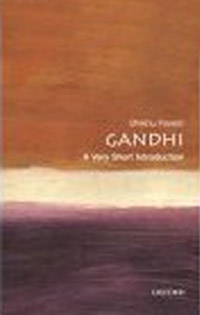By Bhikhu
Parekh
 Like the several other books I’ve read in this
vast series of Very Short Introductions, this serves as probably
the best comprehensive and scholarly introduction to its subject possible.
Each chapter covers a clear area, starting with the narrative of Gandhi’s
life, and then covering his religious and political ideas, the most dynamic
and important of which was Satyagraha, non-violent resistance. In only
125 pages, Gandhi’s very complex and innovative views are presented
concretely and fully.
Like the several other books I’ve read in this
vast series of Very Short Introductions, this serves as probably
the best comprehensive and scholarly introduction to its subject possible.
Each chapter covers a clear area, starting with the narrative of Gandhi’s
life, and then covering his religious and political ideas, the most dynamic
and important of which was Satyagraha, non-violent resistance. In only
125 pages, Gandhi’s very complex and innovative views are presented
concretely and fully.
Since the book is essentially well done, I’ll only mention here
the author’s few flaws that I found distracting. I would have preferred
more photos – there are only about five. There is a helpful glossary
of Gujarati terms (Gandhi’s native tongue) and many of Gandhi’s
own quotes are included in the book as well. While the book understandably
focuses on Gandhi’s views rather than devoting the entire book
to a simple biography of events, I still felt the biographical chapter
was short and needed more elucidation of the political events Gandhi
was acting around. It also never even mentions the long-term effects
of his actions on India, Pakistan, South Africa, and Britain. A great
feature of the book is the author’s honest criticism of Gandhi’s
beliefs, since they were constantly evolving and thinkers have had 50
years to flesh them out and rebut them. But sometimes Parekh spends more
time on the criticism than on the positive aspects of Gandhi’s
philosophy, nonchalantly diminishing his great life work.
- Read November 2002